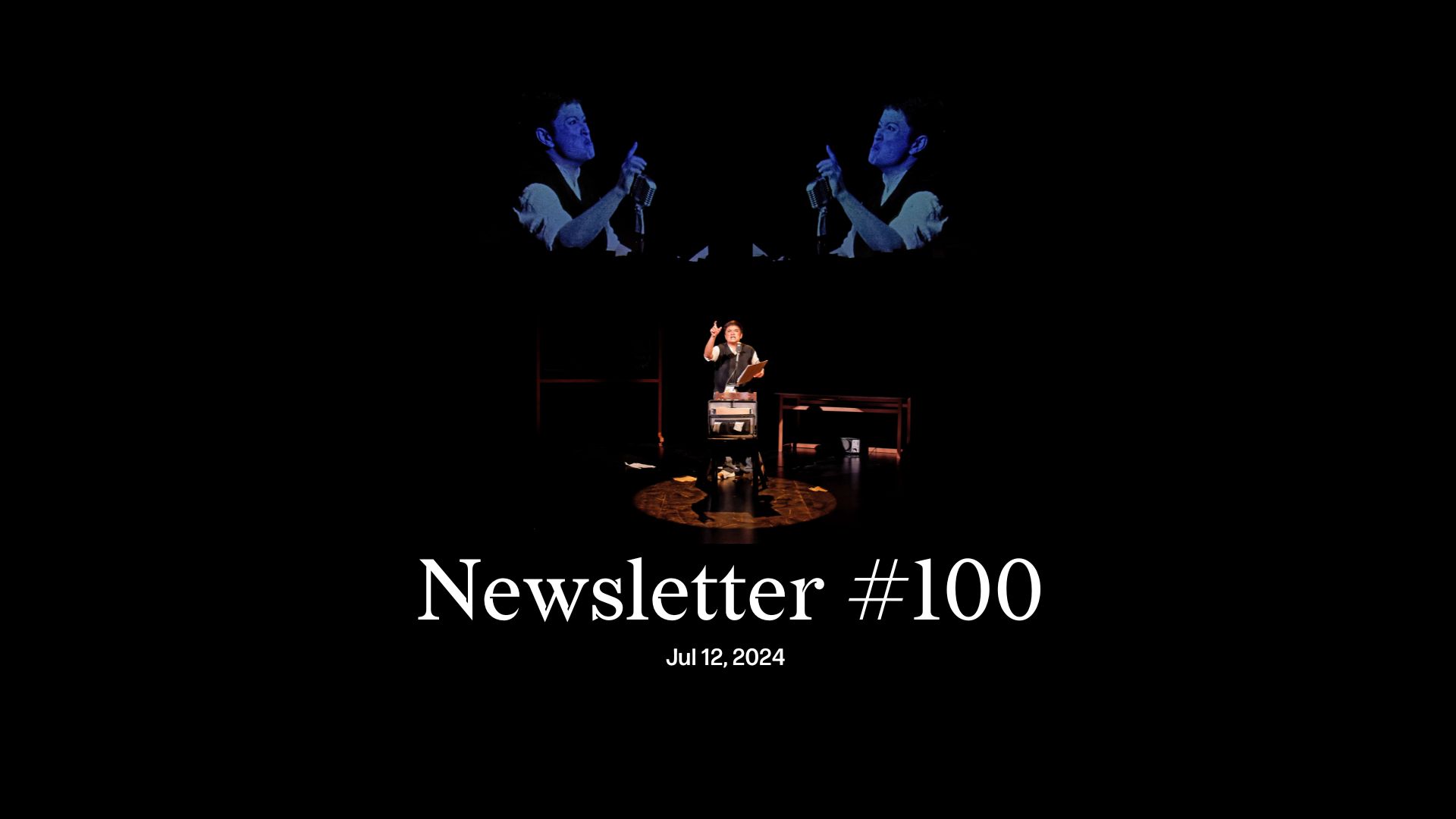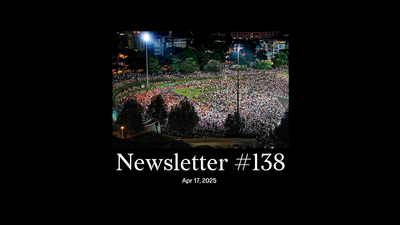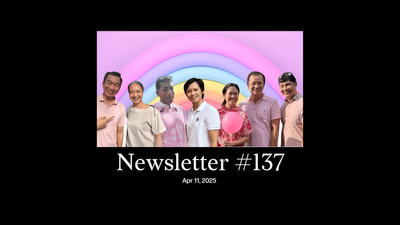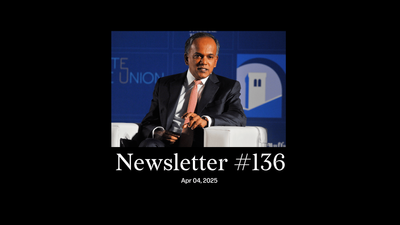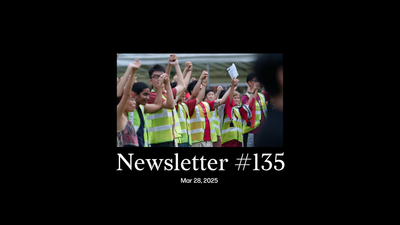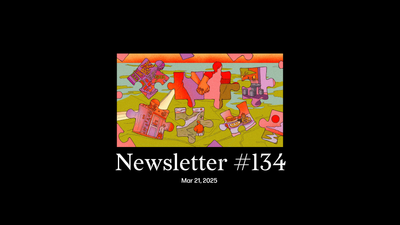Dear reader,
You’re reading Jom newsletter #100! There’s a lot going on today, so lest you suffer death by hyperlink, please click on what you like.
Newsletters. Thanks to the over 5,500 of you who’re now with us on this journey. It’s an appropriate juncture to reflect on some moments we’ve shared—origins, growth, celebration, struggle—these past two years:
- #1: “Isn’t it risky starting a magazine in Singapore?”
- #3: “Why a Malay name for an English-language magazine about Singapore?”
- #30: “Suhaimi Zainul-Abidin and different perspectives”
- #70: “The end of our POFMA journey”
- #98: “Of Jom’s rhythms”
Events. For those who prefer to look ahead, please join Jom and our comrades at the Singapore Independent Media Fair 2024 on July 20th at Cineleisure. There’ll be many academics, activists and journalists speaking, including Kirsten Han of We, The Citizens, Isaac Neo from SG Climate Rally, and Walid J Abdullah of “Teh Tarik With Walid”.
Film. The fair will also host the premiere of “The Euphoria is Real”, a 17-minute documentary by Jom that follows Julianna Maria Hedger, 34, a transwoman, as she navigates her transitioning and gender reassignment journey with the support of her loving family, culminating in a shared liberation and euphoria.
Today, we’ve released the documentary’s trailer. Fair attendees will be the first to watch the film in full, and will also be treated to a post-show dialogue featuring Julianna; Grace Baey, the director; G Pereira, a social worker at The T Project; and Jay Wong, the moderator. Get your tickets now and join us a week from tomorrow.
Letters to the editor. Thanks to Pradeep Krishnan and another Jom reader (who requested anonymity) for their responses to the latest commentary by Harpreet Singh, senior counsel and new member of the Workers’ Party.
“Singapore This Week”. In our weekly digest, we discuss a new Pew survey that reaffirms Singaporeans’ affinity for China and Xi Jinping; the Quahgmire that Singapore Aquatics is in; Miss Universe Singapore’s desire to include “even women who are married, divorced or have children”; Vivian Balakrishnan’s questionable historical arguments to justify Singapore’s position regarding Israel’s war on Gaza; that beleaguered samsui woman; ONE championship; and Love, Bonito.
Essays. Today we’re fortunate to publish work by two Singaporeans renowned in their fields, writing about their respective areas of expertise.
In “The death of the critic, or why it’s really hard to write a bad review in Singapore today”, Corrie Tan, Jom’s arts editor and a long-time theatre critic, uses Alfian Sa’at’s “The Death of Singapore Theatre” as a jumping-off point to discuss censorship and criticism in Singapore. By trawling through her own experiences of censorship and self-censorship from her days at The Straits Times, Corrie engages in deep introspection of her craft, and of the complex, multi-dimensional relationship involving artist, censor, critic, and the audience.
“But what happens if the artist has accumulated more cultural capital than the critic, or if the critic is perceived as unsophisticated or low-brow in their tastes? The most frequent critique of the critic, perhaps, is that they are a parasite who leeches off a work, one who siphons resources and nutrition from an artform in order to make a living, and does so by writing about the work in a state-adjacent media mouthpiece. Those who can’t do, critique—so the bastardised Aristotelian saying might go. The critic then becomes seen as the first censor: yet another ‘content assessor’, rather than a critical interlocutor.”
Corrie’s is ostensibly writing about challenges facing stakeholders in the arts, though, like much of her other work, there are resonances for us all. We all self-censor, and are censored, every day, whether in terms of how we present ourselves to the world, or the behaviours and words deemed acceptable in the different spaces we inhabit. Is that friend a critical interlocutor for your personal growth, or yet another content assessor?
Finally, we’re blessed that Teo You Yenn, sociologist, has allowed us to publish an excerpt from “Ordinary people dream”, her essay in Why Not?: Thinking About Singapore’s Tomorrow, a new compilation edited by Kanwaljit Soin and Margaret Thomas.
“What do ordinary people want? Choice and autonomy, belonging and respect, ethical agency. The current policy regime does not adequately enable these. Above all, the discussion in this section suggests that enabling conditions cannot be created merely by tinkering on the edges of programmes and schemes. What we need is reorientation of the principles embedded in policies—away from an individualistic and market-focused ethos and toward values of equality and mutual care.”
What are the necessary conditions that will enable each of us to exercise choice, autonomy, and ethical agency so that we can live the lives that we want? It is one of the overarching, urgent questions that link our separate and collective efforts: whether that’s building an independent media company, Julianna’s transitioning journey, or striving for a more enlightened, healthier climate of criticism.
Jom!
Sudhir Vadaketh
Editor-in-chief, Jom
p.s. see you in eight days at Cineleisure!
If you’ve enjoyed our newsletters, please scroll to the bottom of this page to sign up to receive them direct in your inbox.

